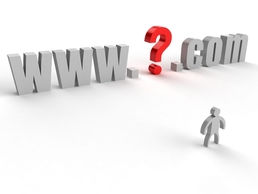Frequently Asked Questions
- How do I protect my identity online?
- I just Googled myself and didn't like what I saw - what can I do?
- Someone I've never met is trying to connect with me... what do I do?
- How do I get people to follow me?
- What is a domain name? Is it free to have my own website?
How do I protect my identity online?

There are a number of different things that you can do to protect yourself online. For starters, keep in mind that nothing you put on the internet is truly temporary. Below are some other useful links to articles that delve deeper into different aspects of online security:
A quick and simple kind to protecting your online reputation.
Protecting your identity with online purchases.
Protecting your privacy when using social media.
A quick and simple kind to protecting your online reputation.
Protecting your identity with online purchases.
Protecting your privacy when using social media.
I just Googled myself and didn't like what I saw - what can I do?

First off, assess the damage. Is it something just mildly embarrassing (an old blog, for example)? If so, try to see if you can deactivate any attached accounts or contact the person running the website. Most likely they'll be happy to take the offensive material off (as long as you ask nicely!).
If it's personal information you are worried about, make sure to contact the white pages about becoming an unlisted number in the phone book. This will remove your private information from a good deal of searches.
If it's a deeper offense, check out THIS inclusive article detailing removing your information from a Google search. There are also people out there willing to do this work for you. MyPrivacy and ExecPrivacy offer varying degrees of service (from free to a consultation basis) to protect your anonymity online. ReputationDefender is a similar service, but more gung-ho. It's for people who's online reputation has been tarnished by reviews and blogs online.
Keep in mind, however, that certain things just can't be completely removed. Matters of public record, such as marriages/divorces/felonies are available for the general security of the public. Journalists enjoy a similar freedom in that things they print belong to them and are available to whomever they wish. The best defense in these cases are to put positive interactions online. The more you Tweet, for example, the higher your Twitter profile shows up in a Google search. Searchers rarely go past the first page in a search, so the harder you work to move your positive interactions up, the easier it will be see those positive results on the first few pages.
If it's personal information you are worried about, make sure to contact the white pages about becoming an unlisted number in the phone book. This will remove your private information from a good deal of searches.
If it's a deeper offense, check out THIS inclusive article detailing removing your information from a Google search. There are also people out there willing to do this work for you. MyPrivacy and ExecPrivacy offer varying degrees of service (from free to a consultation basis) to protect your anonymity online. ReputationDefender is a similar service, but more gung-ho. It's for people who's online reputation has been tarnished by reviews and blogs online.
Keep in mind, however, that certain things just can't be completely removed. Matters of public record, such as marriages/divorces/felonies are available for the general security of the public. Journalists enjoy a similar freedom in that things they print belong to them and are available to whomever they wish. The best defense in these cases are to put positive interactions online. The more you Tweet, for example, the higher your Twitter profile shows up in a Google search. Searchers rarely go past the first page in a search, so the harder you work to move your positive interactions up, the easier it will be see those positive results on the first few pages.
Someone I've never met is trying to connect with me online?!? Do I accept?

That's totally up to you. There are two sides to the debate with online networking.
The first believes that you should only make online connections with people you know personally or friends from someone you know. This side believes that the only good connections are the connections that you have made in real life. You should work to enrich these connections to their fullest potential.
The other side of this debate feels that that idea is very limiting. These people believe that any connection (real or superficial) is good- you just never know what might come of it!
The good news about dabbling into this unknown world is that you can look at people's profiles before making a connection. If someone offers to make a connection on LinkedIn, for example, you can view their profile before accepting. Facebook, on the other hand, is usually a more personal space. If you only want to "friend" people you have physically met- go ahead. However, if you are using a "fan page" for your professional presence, or using Twitter, the goal is to get as many "likes" and "followers" as possible, and blocking someone because you don't know them defeats the purpose.
The first believes that you should only make online connections with people you know personally or friends from someone you know. This side believes that the only good connections are the connections that you have made in real life. You should work to enrich these connections to their fullest potential.
The other side of this debate feels that that idea is very limiting. These people believe that any connection (real or superficial) is good- you just never know what might come of it!
The good news about dabbling into this unknown world is that you can look at people's profiles before making a connection. If someone offers to make a connection on LinkedIn, for example, you can view their profile before accepting. Facebook, on the other hand, is usually a more personal space. If you only want to "friend" people you have physically met- go ahead. However, if you are using a "fan page" for your professional presence, or using Twitter, the goal is to get as many "likes" and "followers" as possible, and blocking someone because you don't know them defeats the purpose.
How do I get people to follow my blog/Twitter?

"If you build it, they will come." Sounds corny, but it's the truth. There is no easy way to get followers, no magic spell that will drive people to you. You simply have to build a place that people want to see on a regular basis.
- DO: Post strong content: No matter the aim of your blog, each post should be unique and of good quality. Mixed media is great at achieving this. Post pictures, videos, web links just as much as you post simple text posts.
- DON'T: Post your daily meal (unless you are a foodie blog and you are showcasing a new restaurant), the same message at the same time, everyday, etc. If you would find it boring to hear from someone else...
- DO: Post consistently. At least once a day for Twitter or a blog. Once a week for Facebook or a blog. Once a month for LinkedIn.
- DON'T: Post constantly. Posting too much will turn off followers, especially if the content isn't that interesting. No more than 10 Tweets a day, 10 blogs a day. No more than five posts a week on a professional Facebook account (personal accounts? Keep it to one or two a day).
- DO: Communicate with people. Did someone Tweet you? Tweet back! There is nothing more annoying than not having your voice heard. On the flip-side, seeing their input put to use is great for marketing. One motherhood site surveyed hundreds of women before launching their site. They surveyed down to the nitty details of font, tab order, and customized log-in. When the site went live and the individuals who were surveyed saw that 100% of their input was used- the site went viral.
- DON'T: Reply back in direct/private message mode (unless the content is personal). Show your followers that you are open to communication.
What is a domain name? Is it free to have my own website?

A domain name is the name of your website. Some are free, some are not. If you are creating a personal webpage, you can't just pick a name add .com after it and expect to get it for free- you have to register it (just like a business or musician). Registration costs money.
However, free webpage creation sites (such as Weebly) will allow you to create a webpage for free- as long as you allow them to include their name. Take this site- Buildyourpersonalbrand.WEEBLY.com. We wanted to make this site for free, so we let Weebly advertise in the URL in exchange for publishing my site.
However, free webpage creation sites (such as Weebly) will allow you to create a webpage for free- as long as you allow them to include their name. Take this site- Buildyourpersonalbrand.WEEBLY.com. We wanted to make this site for free, so we let Weebly advertise in the URL in exchange for publishing my site.
